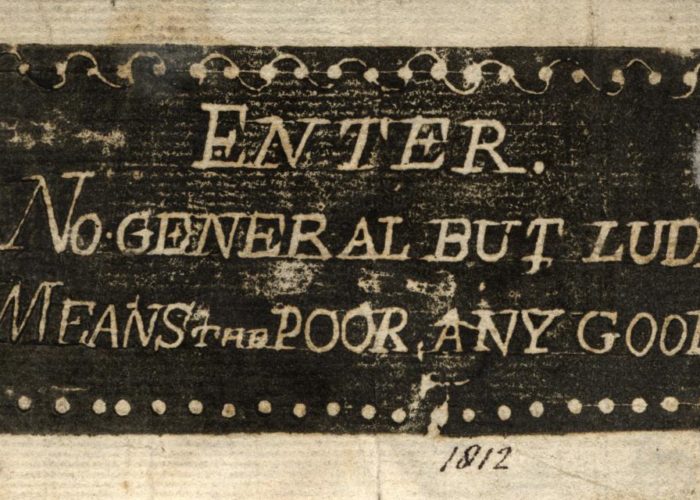Luddite ticket
Theme: Challenging law and order: British riots and reforms, Social and cultural revolution
In the early 1700s, work in the textile industry was mainly hand-operated and undertaken by people skilled in crafts – such as weaving and knitting. But innovations in steam power and the design of machinery in the late 18th and early 19th century transformed manufacturing and the way people worked. Much of the new labour could be undertaken by unskilled workers in factories away from the household, quicker than ever before and for a fraction of the price. Skilled textile workers, who found their livelihoods threatened by new, labour-saving technology, responded witha series of violent protests. They became known as the Luddites.
The Luddites protested by sending threatening letters to factory and mill owners and by attacking machinery. They signed their letters from Captain Ludd (or sometimes King Ludd or General Ludd), a fictitious leader named after a mythical character from the time (much like the Swing rioters who signed their letters of protest from Captain Swing). The first attacks on machinery began in 1811 when as many as 1,000 knitting-frames were destroyed in Nottinghamshire. Similar actions followed from croppers (cloth cutters) in West Yorkshire, cotton weavers in Lancashire and others across the Midlands and the North of England, and continued until 1813.
Luddism was not just a protest about machinery and mass-production. Like many others of the time, most Luddites were also protesting against high taxes, wage cuts and falling living standards in a newly-industrialising Britain. Some had political aims too, such as the reform of parliament to allow ordinary working people to vote and the right to have their voices heard. It was not coincidental that the workers mobilised during the difficult circumstances and shortages created by the Napoleonic Wars.
The authorities reacted strongly to the challenge from Luddism, they were fearful that these violent protests could escalate into a revolution like the recent French Revolution. Laws were introduced making machine-breaking punishable by the death penalty. As there was no official police service at this time, soldiers were sent to factories whose owners feared an attack. In 1812, troops killed at least 10 people when an angry crowd of around 150 Luddites attacked Rawfolds Mill in West Yorkshire. A further 17 were hanged following a highly publicised mass trial in January 1813.
Unsurprisingly, the Luddites met in secret. This simple ticket showing support for General Ludd allowed entrance to one of these meetings in the Manchester area in 1812.
Did you know..?
Today a ‘Luddite’ is a derogatory term for someone who is a bit ‘old fashioned’ and resistant to change – especially in using new technologies.
Sources & acknowledgements
This object description and its related educational resources were researched and written by our team of historians and education specialists. For further information see the item’s home museum, gallery or archive, listed above.
-
Did you know..?
Today a ‘Luddite’ is a derogatory term for someone who is a bit ‘old fashioned’ and resistant to change – especially in using new technologies.
-
Education overview
You can access a range of teachers resources related to this object and more on our education page.
Please also see our glossary of terms for more detailed explanations of the terms used.
-
Curatorial info
- Originating Museum: Chethams Library
- Production Date: 1812
- Material: Paper
- Creation Place: Northern England
- Size: 6x12 cm
- Original record
-
Use this image
Image courtesy of Chethams Library.
You can download this image for personal and educational use but please take note of the license type and rights holder information.
- Rights Holder: © Chethams Library
- License Type:



